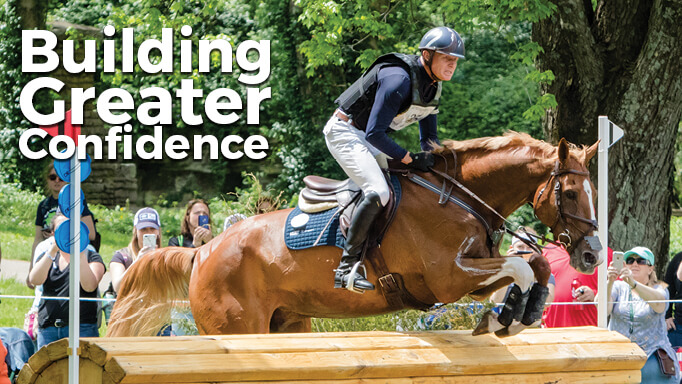When confidence is approached as a feeling, the way to increase it seems to be through willpower. You tell yourself to feel better, to buck up, to believe. It just doesn’t work, however, because your confidence is a set of beliefs you possess about your riding; it is knowledge gained through experience. The feeling-good part is simply a by-product of this new knowledge – a pleasant ‘perk’ if you will.
Riders sometimes find themselves in an uncomfortable spiral where they feel bad but try to ignore the feeling and press on, hoping for some change. But nothing does change, because you’ve only tricked yourself into thinking you’re working hard when you’re only hoping and worrying. So don’t get too hung up on feeling good – figure out ways to be good.
Make a plan to become more confident
The business of changing what you know about yourself as a rider entails action or experience. Think about it: if your horse suffered a lack of confidence over a spooky jump, you would not pat him on the neck and tell him to feel better and believe in himself. You would need to lead him through an experience of handling that spooky jump to build his confidence.
How you improve your own confidence is ultimately the same. The rider who is unsure about her ability, for example, to negotiate a jump from a tight corner needs to seek out experiences that will change this knowledge about herself. With the assistance of her trainer, she may develop a plan that goes from cantering a pole from a tight turn to a larger jump until she understands the skill set required to complete this task. When she does reach this understanding, her knowledge about her ability has changed, and so has her confidence.
“I always make sure I press myself and the horses hard enough at home so that I can go to the events knowing we are capable. And if I am nervous the night before XC, I pull up old videos of myself doing harder things and remember how I felt that day and bring it with me the next day,” says Canadian eventer Lesley Grant-Law.
Train for adversity
Confidence building may not always arise from pleasant circumstances. To be mentally tough, you have to learn how to embrace what are called ‘good bad days.’ Every time something doesn’t go quite right in your training, this opportunity presents itself. You can either allow yourself to opt out – “I just don’t feel quite right today, better quit while I’m ahead” – or you can grab onto it and reap the rewards: “Hey, look, it’s a high-intensity day! The challenge is on!”
Think about how you physically train and prepare your horse. If you want to jump 1.10m in the ring, then usually you jump slightly higher at home to ensure you can both manage the course demands. Competing in the show ring entails facing psychological demands. If the way you train at home is to avoid those psychological demands (quitting after mistakes, deliberately avoiding aspects of training you don’t like), then your mind will be ill-prepared come ring time. Sure, if all goes to your ‘perfection script’ – ideal weather, a responsive and well-behaved horse, a happy, rested coach, etc. then you will be just fine. Throw a few alterations into that scenario and your mind may just struggle to cope.
Once you secure any kind of confidence, don’t think your work is done. Confidence is naturally variable. It can be shaken – even the most elite riders suffer from doubt. It can come on the heels of an accident or while trying to extend yourself to your next plateau of competence. All doubt tells us is that something needs attending to. It sends a message that you are responsible for decoding. If you treat doubt as nothing more than an unpleasant feeling you have to avoid, you are missing an opportunity to grow your confidence and yourself.
with April Clay

